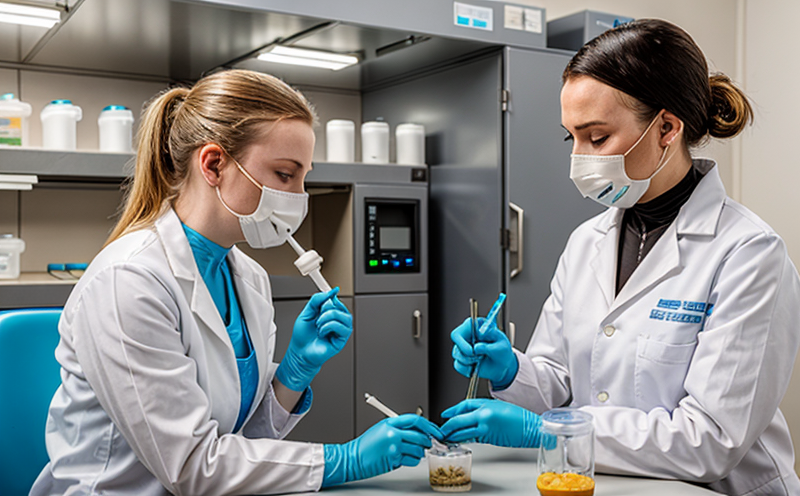EN 22279 Zearalenone Residue Profiling in Infant Foods
The European standard EN 22279 provides a harmonized method for the determination of zearalenone residues in infant foods. This service ensures that food manufacturers, regulatory bodies, and quality managers can reliably detect and quantify zearalenone—a mycotoxin produced by Fusarium fungi—within infant formulae, cereals, and other related products intended for infants.
Zearalenone is a potent estrogenic compound that poses significant health risks if consumed in high concentrations. For infants, even trace levels can lead to developmental issues and hormonal imbalances. Therefore, ensuring compliance with regulatory standards like EN 22279 is paramount for safeguarding public health.
The methodology outlined in EN 22279 involves several critical steps: sample preparation, extraction, cleanup, and analysis using liquid chromatography-tandem mass spectrometry (LC-MS/MS). This approach ensures accurate detection of zearalenone at parts-per-billion levels, making it a robust tool for quality assurance.
Our laboratory adheres strictly to the guidelines provided in EN 22279. We employ state-of-the-art LC-MS/MS instrumentation and highly skilled analysts who are trained specifically on this methodology. This ensures that results are precise, reproducible, and compliant with international standards.
The service includes not only the analysis but also detailed reporting tailored to meet your specific needs. Whether you require simple pass/fail results or comprehensive data breakdowns, our reports provide actionable insights for your product development teams or compliance departments.
Given the importance of this test in protecting infant health and complying with regulatory requirements across Europe, we recommend regular testing as part of ongoing quality control measures. By incorporating EN 22279 into your routine procedures, you can ensure that your products are free from harmful levels of zearalenone.
- Sample Types: Infant formulae, cereals, porridges, and other similar foods
- Target Analytes: Zearalenone (ZEN)
- Methodology: LC-MS/MS following EN 22279 guidelines
- Reporting Options: Detailed analytical reports, compliance certificates, custom dashboards
Industry Applications
This service finds application across various sectors within the food and feed industry. Quality managers rely on this testing to maintain product integrity and ensure compliance with international standards. Compliance officers use these results to avoid potential fines and reputation damage associated with non-compliance.
R&D engineers benefit from this service by understanding contamination sources better, which helps them design safer products. Procurement departments can leverage the findings to source raw materials that meet stringent safety criteria.
Regular testing allows manufacturers to stay ahead of emerging threats and adapt their processes accordingly. It also enables them to respond swiftly to any issues discovered during batch analyses or market surveillance activities.
Eurolab Advantages
At Eurolab, our commitment to excellence extends beyond just meeting regulatory expectations; we go above and beyond by offering unparalleled accuracy, precision, and reliability. Our ISO/IEC 17025 accreditation ensures that every test performed meets the highest quality standards.
We invest heavily in cutting-edge technology and continuously update our methodologies based on latest scientific advancements. This commitment to innovation means that when you choose Eurolab for your EN 22279 zearalenone testing needs, you are benefiting from best-in-class expertise.
Our experienced team of scientists provides personalized support throughout the process, ensuring seamless integration into existing workflows while providing expert advice whenever needed. From initial consultation through final report delivery, we strive to make your experience as smooth and efficient as possible.
Environmental and Sustainability Contributions
- Reduction in food waste: By ensuring product safety early on, this service helps minimize recalls and rejections at later stages of production.
- Promotion of sustainable practices: Ensuring that only safe products reach consumers supports long-term sustainability goals by reducing the need for corrective measures down the line.
- Supports regulatory compliance: Helping businesses adhere to environmental regulations promotes overall ecological balance and reduces harm caused by contaminated products entering the market.





